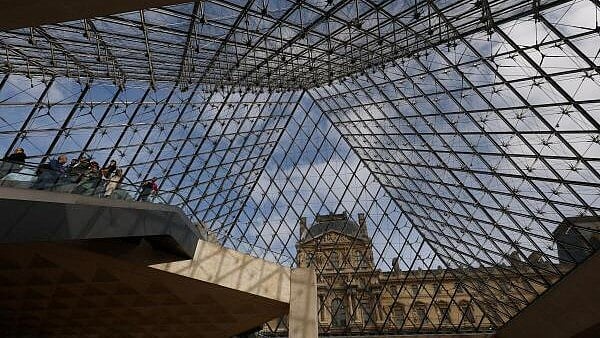
Paris' Louvre Museum.
Credit: Reuters Photo
The recent robbery at the Louvre unfolded like a scene from a thriller.
In broad daylight, a small group of thieves slipped through one of the most guarded museums on earth and vanished with jewels said to be ‘priceless’. Cameras rolled, sirens followed, the world gasped. For days, Paris became a stage for astonishment. How could this happen here, to them?
Because for those of us from the old colonies, this was not the first daylight robbery Europe had seen. There was another, slower one. A theft that lasted centuries, dressed in velvet and law, committed not by masked men but by monarchs and ministers. The loot was not just diamonds, but dignity.
India knows this story too well. From the treasures of our temples to the gems that once adorned our princely state rulers, much of what was ours now sits in glass cases under foreign lights. Artefacts that once carried spiritual or communal meaning are reclassified as 'objects of art’. In that translation, something sacred becomes something saleable.
The moral theft, therefore, isn’t just of the object but of the meaning it once held. The Koh-i-Noor rests in a crown that tells a story not of glory, but of loss. Even our textiles, and spices became the scaffolding of someone else’s prosperity. Even the wealth generated by Indian labour was absorbed into foreign treasuries. Economists estimate that India’s wealth drain under colonial rule was so vast that it rewired global inequality itself, pushing India into structural poverty that would take generations to reverse.
The Louvre incident is an assault on heritage. But history too is a museum, and much of it remains locked behind the glass of imperial pride. Civilisations were emptied of their meaning and told they had been 'civilised’. When commentators speak of cultural loss today, their outrage rarely stretches far enough to touch the wounds left by empire.
Yet, there is something deeply symbolic about this heist — a reminder that even the powerful are not beyond vulnerability. The great capitals that once ruled the world now find themselves robbed in the open. The same cities that extracted wealth from continents can no longer protect their own treasures. Paris, London, Rome, once names that evoked invincibility, now carry a quiet fatigue.
For Indians, the feeling is complex. One cannot condone theft, yet one cannot ignore the moral asymmetry.
Time for deeper honesty
The Louvre heist also exposes the most guarded institutions can be broken into; even the most revered collections can disappear. That vulnerability extends to moral ownership too. Europe cannot claim to be the custodian of global heritage while remaining reluctant to return what was taken in conquest. The time has come for a deeper honesty — one that recognises not just the beauty of what is displayed, but the violence of how it arrived there.
Surely, one should not be bitter about these. History cannot be undone, but it can be confronted. Empires profited not only in wealth but in narrative control. They wrote themselves as saviours and civilisers, and their museums became temples to that version of the story. Yet restitution is about rewriting that narrative with integrity.
When nations defend their museums as guardians of world culture, they rarely see that their walls are also archives of amnesia. Every display case that tells one civilisation’s story also hides another’s in silence.
Theft and disguise
Europe today wrestles with the very inequities it once exported. The social contracts that powered its prosperity are fraying; inequality deepens, faith in institutions wanes, and the promise of fairness that defined the post-War era stands diminished. Migration, austerity, and populism now haunt the same capitals that once mapped the world’s destinies. The pursuit of economic justice, once dismissed as the grievance of the colonised, has come home to the coloniser.
Human desire drives all thefts. The difference lies in the disguise. The modern one wears gloves and a mask, or even a complex digital algorithm. It is about the continuity of greed, dressed in different eras’ fashions.
There is, too, another kind of robbery that continues in our own time, but just as devastating. The theft of the planet’s climate.
The West industrialised first, fuelling its growth with coal, colonies, and convenience, while the Global South paid the environmental price. Forests were stripped, rivers poisoned, air darkened — and now, those same nations that built their wealth on unchecked emissions lecture the rest of the world about restraint. The so-called climate funds promised to developing nations remain largely unfulfilled, their figures inflated, their timelines elastic. It is a new kind of imperialism — moral in tone, material in impact — where guilt is expressed in conferences, but justice is deferred in budgets.
Once, they extracted our resources; now they hoard the planet’s carbon space, leaving us to bargain for the right to breathe clean air, or for other nations to progress industrial-wise.
Empire no longer arrives in ships. It also comes dressed in ratings, patents, and trade rules. The moral geometry remains unchanged — wealth still flows upward, and the developing world is still expected to prove its worthiness for fairness. Colonialism was once justified by race and religion; today it hides behind regulation and credit.
What, then, does justice look like? Not just an apology, or a cheque, but a reckoning — a willingness to face the uncomfortable arithmetic of history. To admit that wealth and culture were moved, often by force, and that restoration is part of healing.
The past is never over. It simply waits for the future to become honest.
Srinath Sridharan is a corporate adviser and independent director on corporate boards. X: @ssmumbai.
(Disclaimer: The views expressed above are the author's own. They do not necessarily reflect the views of DH.)